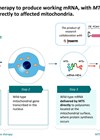Ophthalmology archive for 2020
The Leicester Grading System for Foveal Hypoplasia
The University of Leicester Ulverscroft Eye Unit have published the first medical grading system named after the city of Leicester. Infantile nystagmus is characterised by constant and involuntary eye movements and affects 24 per 10,000 people [1]. Onset is usually...
A focus on Pakistan’s growing eye care needs: over 43 million patients treated for curable blindness free of charge
With 90% of the world’s visually impaired living in developing countries, Pakistan is no exception to this on-going global healthcare challenge. Despite massive leaps over the last few decades in targeting this issue, the World Health Organisation (WHO) reports that...
Renewed momentum in ocular gene and cell therapy, broadening application to chronic disease
Gene and cell therapies offer the prospect of ground-breaking new avenues for the treatment of diseases, reflected in a renewed explosion of interest and investment in retinal gene therapy. Rod McNeil reports recent clinical trial readouts across a diverse range...
Unconscious bias (part 2)
Does unconscious bias exist, and does training help to reduce discriminatory behaviour? Clare Inkster questions her role as a trainer. I read Gwyn Williams’ Learning Curve article on this topic a few months ago with interest, and as someone who...
Setting up successful safe & efficient nurse-led intravitreal injection service
In September 2019, we organised a training course at Great Western NHS Hospital (GWH), Swindon, which provided presentations, discussions and hands-on wet lab experience on how to perform intravitreal injection using intravitreal assisted device (INVITRIA) for nurses and doctors from...
Designing ophthalmology services - Part 1: How do we address the queues in a clinic?
This first of a three-part series shows how systems engineering can be used to correctly diagnose and address the causes of delays in a clinic. The second article, which will be featured in the April/May 2020 issue, describes how to...










